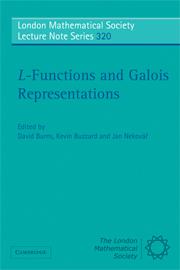Book contents
- Frontmatter
- Contents
- Preface
- List of participants
- Stark–Heegner points and special values of L-series
- Presentations of universal deformation rings
- Eigenvarieties
- Nontriviality of Rankin-Selberg L-functions and CM points
- A correspondence between representations of local Galois groups and Lie-type groups
- Non-vanishing modulo p of Hecke L–values and application
- Serre's modularity conjecture: a survey of the level one case
- Two p-adic L-functions and rational points on elliptic curves with supersingular reduction
- From the Birch and Swinnerton-Dyer Conjecture to non-commutative Iwasawa theory via the Equivariant Tamagawa Number Conjecture - a survey
- The André-Oort conjecture - a survey
- Locally analytic representation theory of p-adic reductive groups: a summary of some recent developments
- Modularity for some geometric Galois representations - with an appendix by Ofer Gabber
- The Euler system method for CM points on Shimura curves
- Représentations irréductibles de GL(2, F) modulo p
Locally analytic representation theory of p-adic reductive groups: a summary of some recent developments
Published online by Cambridge University Press: 20 April 2010
- Frontmatter
- Contents
- Preface
- List of participants
- Stark–Heegner points and special values of L-series
- Presentations of universal deformation rings
- Eigenvarieties
- Nontriviality of Rankin-Selberg L-functions and CM points
- A correspondence between representations of local Galois groups and Lie-type groups
- Non-vanishing modulo p of Hecke L–values and application
- Serre's modularity conjecture: a survey of the level one case
- Two p-adic L-functions and rational points on elliptic curves with supersingular reduction
- From the Birch and Swinnerton-Dyer Conjecture to non-commutative Iwasawa theory via the Equivariant Tamagawa Number Conjecture - a survey
- The André-Oort conjecture - a survey
- Locally analytic representation theory of p-adic reductive groups: a summary of some recent developments
- Modularity for some geometric Galois representations - with an appendix by Ofer Gabber
- The Euler system method for CM points on Shimura curves
- Représentations irréductibles de GL(2, F) modulo p
Summary
The purpose of this short note is to summarize some recent progress in the theory of locally analytic representations of reductive groups over p adic fields. This theory has begun to find applications to number theory, for example to the arithmetic theory of automorphic forms, as well as to the “p-adic Langlands programme” (see [3, 4, 5, 10, 11, 12]). I hope that this note can serve as an introduction to the theory for those interested in pursuing such applications.
The theory of locally analytic representations relies for its foundations on notions and techniques of functional analysis. We recall some of these notions in Section 1. In Section 2 we describe some important categories of locally analytic representations (originally introduced in [20], [23] and [8]). In Section 3, we discuss the construction of locally analytic representations by applying the functor “pass to locally analytic vectors” to certain continuous Banach space representations. In Section 4 we briefly describe the process of parabolic induction in the locally analytic situation, which allows one to pass from representations of a Levi subgroup of a reductive group to representations of the reductive group itself, and in Section 5 we describe the Jacquet module construction of [9], which provides functors mapping in the opposite direction. Parabolic induction and the Jacquet module functors are “almost” adjoint to one another. (See Theorem 5.19 for a precise statement.)
Acknowledgments. I would like to thank David Ben-Zvi for his helpful remarks on an earlier draft of this note, as well as the anonymous referee, whose comments led to the clarification of some points of the text.
Information
- Type
- Chapter
- Information
- L-Functions and Galois Representations , pp. 407 - 437Publisher: Cambridge University PressPrint publication year: 2007
Accessibility standard: Unknown
Why this information is here
This section outlines the accessibility features of this content - including support for screen readers, full keyboard navigation and high-contrast display options. This may not be relevant for you.Accessibility Information
- 6
- Cited by
